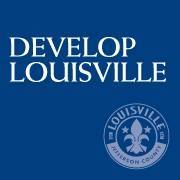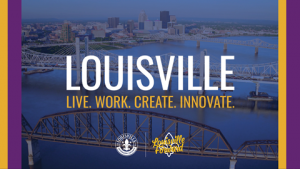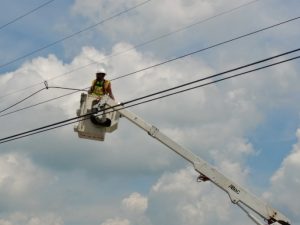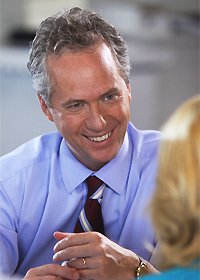 Louisville Metro Government closed on two agreements through its Energy Project Assessment District (EPAD) program that will provide more than $2 million in private loan funds for energy efficiency projects at Tennis Club at Springhurst and a new La Quinta Del Sol hotel.
Louisville Metro Government closed on two agreements through its Energy Project Assessment District (EPAD) program that will provide more than $2 million in private loan funds for energy efficiency projects at Tennis Club at Springhurst and a new La Quinta Del Sol hotel.
“The science behind global climate change is indisputable, and in order to make a difference, individuals, organizations, business and government must all take action to reduce emissions and shift to more renewable energy sources,” said Mayor Greg Fischer. “Offerings like the EPAD Program help property owners invest in renewable energy and energy efficiency upgrades to benefit our environment.”
The EPAD Program (known nationally as Property Assessed Clean Energy, or “PACE”) is a financing mechanism that helps property owners repay loans for energy efficient, renewable energy and water conservation projects with no down payment. All the capital comes from private sources.
Unlike a traditional loan however, loans through the EPAD program are affixed to the property title, rather than the property owner, and are repaid through a voluntary annual assessment administered by the Jefferson County Sheriff. Applicants also can receive loans that cover up to 100% of the project’s hard and soft costs.
Company Sachi LLC received a 25-year, $1.7 million loan from PACE Equity to install a high-performance building envelope, a high-efficiency HVAC system, 52 solar panels, and 20 windmills at a 94-room La Quinta Del Sol currently under construction near Old Henry Road.
Dr. Sunny Dronawat, managing member of Sachi LLC, said investing in renewable energy makes good business sense. “Consumers feel good when they spend their money on goods and services that incorporate sustainability, green energy elements and energy conservation elements into their business practices. The Millennial generation is spending money on hotels that incorporate green elements.”
Installations began in April 2018 and are estimated to be completed by Summer 2020. A Utility Impact Analysis completed by PACE Equity estimated total projected energy savings of more than 420,000 kWh annually – enough energy to power 50 houses for one year or take 63 passenger vehicles off the road.
“Working with Sunny on the La Quinta Del Sol in Louisville is a shining example of utilizing PACE financing. It allowed the hotel to incorporate substantial energy efficiency and renewables but also a low-cost funding mechanism to pay for those items. PACE Equity continues to be the leader in utilizing Property Assessed Clean Energy financing for new construction,” said Ethan Elser, executive vice president of PACE Equity.
The La Quinta Del Sol and Tennis Club at Springhurst are the third and fourth projects funded through Louisville Metro’s EPAD program.
Tennis Club at Springhurst received a $400,000 loan from Lever Energy Capital to upgrade its existing lighting system with state-of-the-art LED technology and install a new HVAC system. The loan will be repaid over 15 years.
“The EPAD Program has allowed us to easily finance a much better system than we could afford through general cash flow. And the financing process is so easy and straightforward. We loved the process and love the product,” said Chris Mather, owner of the Tennis Club at Springhurst and Louisville Sports Academy.
Learn more about the EPAD program at https://louisvilleky.gov/government/sustainability/epad-program.
In addition to the EPAD Program, Louisville Metro Government, through its Office of Advanced Planning and Sustainability, offers incentives to property and business owners to invest in measures via its Cool Roof Rebate Program to combat the Urban Heat Island effect and reducing cooling costs.
The Office of Advanced Planning and Sustainability released a draft Emissions Reduction Plan in late 2019 and will finalize that plan in February 2020. Learn more about the Emissions Reduction Plan here: https://louisvilleky.gov/government/sustainability/greenhouse-gas-inventory
In 2020, Louisville Metro Government will continue to electrify its vehicle fleet, will replace 25,000-square-feet of roofs on Metro-owned buildings with cool roof technology, will explore an environmental purchasing policy, and will release a climate adaptation plan with actionable items for Louisville Metro and other partners. The city also is in regular conversation with LG&E regarding more renewable energy options for Louisville Metro operations
For more information about the Office of Advanced Planning and Sustainability and its efforts, visit https://louisvilleky.gov/aps.

Photo: Louisville Forward
During the month of October, Mayor Greg Fischer will join local leaders, business owners, and workforce development providers to celebrate National Manufacturing Month. Accounting for 12 percent of the region’s total employment, manufacturing continues to be a major driver in the Louisville economy, with companies ranging from automotive to home appliances, machining and chemicals.
The manufacturing sector employs more than 80,000 workers regionally, working at approximately 1,400 manufacturing companies. The industry accounts for 16.5 percent of the region’s annual GDP, compared to 11.2 percent of national GDP.
“Louisville has a storied history as a manufacturing hub that it continues to benefit from today. As the industry evolves, we have expanded our skilled workforce pipeline through key partnerships with local manufacturers, Jefferson County Public Schools, and KentuckianaWorks to meet the growing need for employees with technology skills,” said the Mayor. “We are excited to work with these partners and others to give our students an inside look at the broad-ranges of careers available in our strong and diverse manufacturing sector.”
In recognition of Manufacturing Month, Mayor Fischer will join employee-owned heating and cooling manufacturer and metal fabricator KCC Companies on Oct. 3 in welcoming students from local high schools and technical colleges to tour its facilities and learn about the advantages of a career in manufacturing. The Mayor also will join GE Appliances next week for an announcement that will benefit the next generation of manufacturing employees.
As manufacturing grows in the Louisville region, the demand is increasing for workers who have greater skills and training. The Academies of Louisville initiative in JCPS exposes students to career options in the manufacturing industry and early training opportunities, and Kentucky Manufacturing Career Center, run by KentuckianaWorks, helps people identify career pathways that manufacturing companies have to offer and to attain new skills to advance their careers.
Last academic year, there were more than 2,000 students in manufacturing pathways in the Academies of Louisville, and KentuckianaWorks helped clients earn 618 certificates through the Kentucky Manufacturing Career Center.
KentuckianaWorks is currently offering several free training courses designed to quickly prepare people for good jobs with local manufacturing companies. They include:
- The Manufacturing Training and Employment Connection (M-TEC), an intensive, 3-week program where participants can earn multiple training certificates valued by manufacturing companies. The next class starts Oct. 7.
- The MSSC Certified Production Technician (CPT) training, a four-week course that gives people an industry-recognized credential. The next class starts Oct. 28.
KentuckianaWorks will close out Manufacturing Month with a job fair from 11 a.m. to 3 p.m. on Tuesday, Oct. 29, at Kentucky Manufacturing Career Center, 160 Rochester Drive. The event will include employer booths, legal aid and expungement, college admissions advisors, live music, free food, and giveaways.
Louisville-based manufacturers and those participating in events are encouraged to join in Manufacturing Month by using #MadeInLou on social media.
To learn more about Louisville’s robust manufacturing sector, visit https://louisvilleky.gov/government/louisville-forward/advanced-manufacturing.
 The Kentucky Communication Network Authority (KCNA), the agency responsible for overseeing the Commonwealth’s KentuckyWired fiber optic cable network project, finalized a bond sale of $102,090,000 last week.
The Kentucky Communication Network Authority (KCNA), the agency responsible for overseeing the Commonwealth’s KentuckyWired fiber optic cable network project, finalized a bond sale of $102,090,000 last week.
The City of Williamsburg issued the bonds for the KentuckyWired Infrastructure Company. The Series 2019 municipal bonds were purchased by Morgan Stanley.
The majority of the proceeds—$93 million—will be used to fund the settlement agreement between KCNA and its primary contractor, NG-KIH Design Build LLC. The remainder will be held to fund project needs.
According to KCNA Interim Executive Director Deck Decker, KCNA was able to save millions of dollars through the structure of this deal and favorable market conditions. “KCNA was able to access a market with historically low rates to reap maximum benefit from this deal,” he said.
Construction of the KentuckyWired project is well over halfway complete, with more than 1,700 miles of the planned 3,000 miles of fiber cable placed so far. Construction is complete in the first section from Lexington to Louisville and Cincinnati, known as Ring 1A. Construction of Ring 1B, in Eastern Kentucky, is projected to be finished in early September.
KentuckyWired is a middle mile network, building high-speed fiber optic cable in all 120 counties, connecting government offices, universities, community colleges, state police posts, and state parks.
Along its 3,000-mile path, private companies can connect to the network and lease its fiber. This will enable private internet companies to expand their service farther into more rural areas. KentuckyWired will significantly enhance opportunities for education, healthcare, economic investment and job growth for Kentuckians.
 Mayor Greg Fischer announced today that Louisville is joining cities across the globe by setting a goal of an 80 percent reduction in greenhouse gas emissions by 2050.
Mayor Greg Fischer announced today that Louisville is joining cities across the globe by setting a goal of an 80 percent reduction in greenhouse gas emissions by 2050.
In May 2016, Mayor Fischer signed the Global Covenant of Mayors, an agreement signed by leaders of more than 9,000 cities across the world committing to inventory and develop a strategy to reduce greenhouse gas emissions. Globally, cities play a major role in these efforts, as 70 percent of greenhouse gas emissions come from cities.
Greenhouse gases get trapped in the atmosphere, which causes warming and leads to climate change. These gases are emitted when we drive, turn on the lights in our homes and buildings, and when waste breaks down in the landfill, among other sources.
The city’s Global Covenant commitment is a three-step process: conducting the inventory, setting a reduction target and creating a strategy to meet that target.
Louisville inventoried its greenhouse gas emissions in 2017, releasing a draft report indicating emissions had been reduced by 16.9 percent between 2010 and 2016. Further review, including additional information regarding Louisville’s energy use, clarified that the actual community-wide decrease in emissions was 10.1 percent.
“Clearly, there is work to be done,” Mayor Fischer said. “But this is about protecting the future of our planet. Many of our city’s largest businesses already have adopted corporate practices and goals that will help us move the needle, and we urge individuals to do their part as well. It will take all of us to achieve this very ambitious goal.”
Cities across the country, such as Cincinnati, Atlanta, Cleveland, Denver and Philadelphia, are also setting a reduction goal of 80 percent, which aligns with the scientific consensus of what is required to avoid the most damaging effects of climate change.
For Louisville, the next step is to develop a strategy on how we as a community will achieve the goal in a way that supports our goals for creating a more resilient, equitable and environmentally just city.
The city has created a survey to gauge public interest and support for potential options, such as planting more trees, conserving energy or using automobiles less.
Copies of the survey will be shared at upcoming community meetings, and an online survey is available at the city’s website, www.louisvilleky.gov, and at Louisville Free Public Library branches.
The next phase of the city’s Global Covenant of Mayors commitment is to begin climate adaptation planning, which will be conducted in alignment with the city’s Louisville Resilience program.
Staff from the Louisville Metro Office of Sustainability will meet with community groups in coming months to gather feedback and further elaborate on next steps. The first of those meetings will be with the Rubbertown Community Advisory Council on Jan. 10 and the 100 Resilient Cities Work Group on Jan. 28. If you would like for staff to attend your neighborhood association, board or city council meeting, please call 574-6285 or email sustainability@louisvilleky.gov
For more information on Louisville’s effort to reduce greenhouse gas emissions, please visit https://louisvilleky.gov/government/sustainability/greenhouse-gas-inventory
Mayor Greg Fischer announced today that the Office of Sustainability has implemented its first Energy Project Assessment District (EPAD) project with partner Citizens Union Bank (CUB).
EPAD is a tool that encourages property owners install energy efficiency mprovements, renewable energy and water conservation measures at commercial and multi-family properties, by allowing them to acquire private funding that can be paid off through a voluntary assessment administered by the Jefferson County Sheriff in the same manner as a property tax bill. The program allows property owners to extend the term of the loan to 30 years and finance up to 100 percent of an energy project’s cost.
The city’s first EPAD project was made possible through a loan from CUB and allowed property owner Tony Holland to construct a 15-unit apartment at 110 Weisser Avenue with high-efficiency heating and cooling controls, an exterior insulation system and cool roofing materials.
“I applaud the Office of Sustainability, CUB and Tony Holland for forming a partnership to make our city more sustainable. This project is a showcase of how property owners and developers can make a great financial choice that will have great environmental benefits for our community,” Mayor Fischer said. “Our city needs more lending institutions and property owners to partner with us on projects like this one.”
“We are thrilled to close on the first project of our EPAD program. EPAD will help promote energy efficiency and will ultimately contribute to reducing greenhouse gas emissions and improving the quality of life in Louisville,” said Louisville Metro Office of Sustainability Director Maria Koetter. “We applaud Tony Holland and CUB for paving the way.”
“At CUB we care a great deal about conservation efforts that benefit the communities we serve”, said David Bowling, CUB’s CEO. “We are proud to be able to partner with the City and property owners like Tony Holland on the EPAD Program. They were great to work with and hopefully this will be just the beginning of many similar projects in the future.”
The EPAD program offers unique benefits to the property owner, including low interest, and fixed rates that are affixed to the property title and not the property owner. That separation means the property owner is not tying up other credit lines for essential operating expenses.
Energy efficient improvements and renewable energy projects—like solar panels, green roofs and LED lighting—aid in Louisville Metro’s efforts alleviate urban heat and decrease the amount of pollutants impacting local air quality.
EPAD financing is available to office, retail, industrial, non-profits and multi-family residential units consisting of five or more dwelling units. Commercial properties include for-profit businesses and non-governmental, non-residential, tax-exempt properties such as privately operated community centers and hospitals.
An eligible energy-efficient, water-efficient or renewable energy improvement project must have a minimum cost of $20,000, a useful life of at least five years and be permanently affixed to the property title. Additionally, the property owner must demonstrate that the project reduces energy or water usage or generate renewable power for the property and that the improvements will remain with property upon sale or transfer of title.
The Kentucky General Assembly enacted legislation in 2015 authorizing local governments to establish EPADs and an ordinance approved by Metro Council in 2016 designated the entirety of Louisville Metro as an EPAD.
 Kentucky Venues’ guests who are blind or visually impaired will soon have access to an innovative technology that will improve their ability to navigate around large spaces and events.
Kentucky Venues’ guests who are blind or visually impaired will soon have access to an innovative technology that will improve their ability to navigate around large spaces and events.
Kentucky Venues, which operates the Kentucky International Convention Center (KICC) and the Kentucky Exposition Center (KEC) recently partnered with the American Printing House for the Blind (APH) on their Nearby Explorer mobile app.
The app, developed by APH, gives people who are blind or visually impaired audio cues about the world around them and communicates information with beacons that will be installed at strategic points throughout both KICC and KEC.
The app offers an unmatched level of independence when moving through unfamiliar buildings, especially large ones like KICC or KEC. It provides the equivalent of electronic signage, so the user knows what rooms, stairs, etc. are in the vicinity.
“As a user of the app who is blind, I appreciate knowing the general layout of the venue,” said Larry Skutchan, Director of Technology Product Research at APH.
“This way, I can walk in the correct direction, find rooms, find stairs, etc. Even if walking with another person, it is super helpful to get information about what is around.”
Installation of the beacons is anticipated to be complete at both properties by January 31, 2019.
“Accessibility and innovation have always been important to our organization,” said David S. Beck, President and CEO of Kentucky Venues.
“We are proud to partner with APH and want to assist all guests so they feel comfortable as they navigate through our facilities.”
The Nearby Explorer app is available for both Apple and Android phones.
The historic Iroquois Amphitheater has changed its ticketing point of sale system from TicketFly to Eventbrite effective immediately. Eventbrite purchased TicketFly in September 2017.
“As a result of this change, the ticket purchasing experience will occur more smoothly,” said Dana Kasler, Interim Director of Louisville Parks and Recreation. “It’s going to be much better for the customer.”
According to Billboard Magazine, the purchase of TicketFly established Eventbrite as the “most dominant player” in ticketing’s middle market of indie promoters, festivals and music venues. With a seating capacity of approximately 2,400, the Amphitheater is a more intimate setting than major venues like the KFC Yum! Center, but still has attracted a full slate of national and internationally-known musical acts over the past several years, including the Black Keys, Alabama Shakes, Old Crow Medicine Show, Govt Mule, Billy Idol, Wilco and Louisville’s own My Morning Jacket.
Amphitheater staff will still maintain the iroquoisamphitheater.com website and its social media accounts on Facebook and Twitter. The website will still contain a link for customers to use when purchasing tickets. Concert goers can also purchase tickets at Eventbrite.com or download the Eventbrite app from the app store on their mobile phones or devices.
Also, the Amphitheater office at 1080 Amphitheater Road in Iroquois Park is open from Monday-Friday, 9 a.m. – 4:30 p.m. Those who purchase tickets in person at the office are not subject to paying online service feeds.
“The Iroquois Amphitheater is excited to be a part of the Eventbrite family,” said Michael Hallett, manager of the Iroquois Amphitheater. “The increased marketing strength which Eventbrite has will continue to elevate the status of our venue.
 Weather
Weather Traffic
Traffic @LouisvilleDispatch
@LouisvilleDispatch @LouisvilleDisp
@LouisvilleDisp Subscribe
Subscribe
